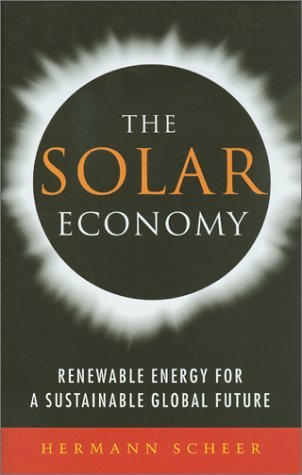
Dr. Hermann Scheer is a social-economist, author, Member of the Bundestag, Member of the German House of Parliament since 1980, President of EUROSOLAR, General Chairman of the World Council for Renewable Energy
In Praise of Creative Destruction. To unlock the economic and environmental benefits of renewable energy, dismantle the conventional power industry! [Ode Magazine, 2009 December]
Humanity stands on the threshold of an era of unprecedented opportunities. In the past decades, many innovative new technologies have become available and affordable that can transform our current economies based on polluting fossil fuels into sustainable renewable energy economies. This transformation will provide millions of new jobs. It will halt global warming. It will create a more fair and just world. It will clean our environment and make our lives healthier. However, for all this positive change to happen, we don’t need an international climate treaty. We don’t need a Copenhagen Protocol, just like we didn’t need a Kyoto Protocol. In fact, these international attempts stand in the way of the progress almost all of us need.History provides many examples of technological revolutions that have reshaped the world. However, none have run their course without encountering massive resistance. No change has been brought about in consensus with those on the losing end, and none has been the subject of an international treaty—even where the effects were felt on a global scale.
Nevertheless, many of these revolutionary changes needed a political framework or targeted help at their inception in order to develop and showcase the economic and cultural benefits. The list includes railways, electricity grids, the car, shipping and aviation, nuclear power, telecommunications and information technologies. Not one happened by an international contract. Anyone who would have suggested introducing the Internet through an international system of binding quotas to prevent economic disruption would have been derided as an economic illiterate. All these technological revolutions happened because there were front-runners who showed the advantage of the new technology. These examples motivated more and more people, companies and governments to do the same...
Busting Myths, Leading Transition. The architect of Germany’s successful renewable energy law describes what it will take to effect a global shift. [2007 May/June]
This article is republished courtesy of SOLAR TODAY, the award-winning magazine published by the American Solar Energy Society.
Solar Solution, Moving from a Fossilized Economy to a Solar Economy from Resurgence Magazine [2004?]
"Only the deliberate replacement of fossil-fuel consumption by solar energy will end the destructive dynamics of the fossilized global economy and its economic structure, and create a viable, varied and human-scale dynamics of development."
Solar Economy [2004]
"The Solar Economy offers an alternative programme to the Kyoto Protocol. It details the links between energy resources and economic structures that have given rise to the fossil energy economy, and maps the dynamic road towards renewable energy that will lead to a new and sustainable global economy."Fossil resources brought the industrialized countries their prosperity. Yet now that their cost outweighs their benefits, fossil resources may bring those self-same countries to their knees. It is the principal thesis of this book that renewable energy, by contrast, brings greater social benefits the more widely it is used, to the point where it fully replaces all fossil energy. There can be no sound reason for making this revolution of our resource base contingent on obligations agreed under international treaties."
A review of The Solar Economy by Simon Roberts [2004]
Hydrogen - Revolution or Illusion? A Debate on Hydrogen between Hermann Scheer and Jeremy Rifkin at DaimlerChrysler [2003]
Energy is a driving force for our civilisation, Solar Advocate, by Alenka Burja, [2001?]
"Hermann Scheer´s feed-in electricity law has made Germany the world leader in production of wind energy in only ten years – World political conflicts mainly stem from a lack of availability of energy resources – Many African countries spend up to 80 % of their income for fossil fuels – Introducing renewable energy technologies is a big step for the whole world economy."See additional documents at Hermann Scheer's website.